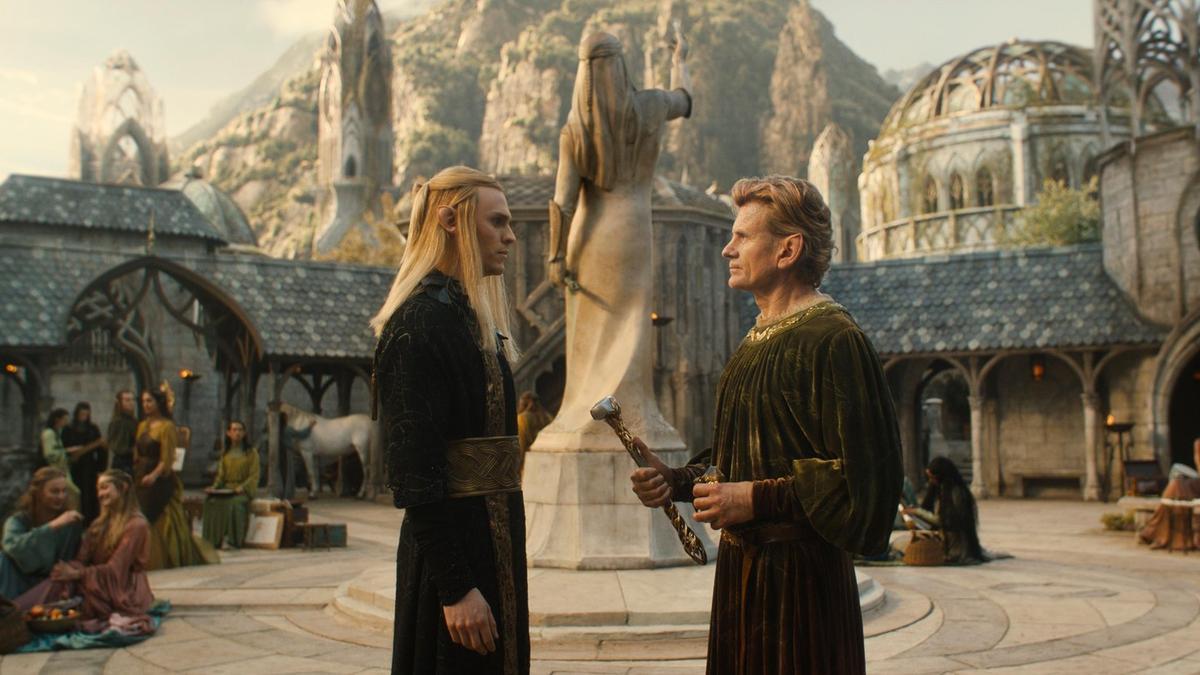
The season finale of The Rings of Power’s second installment may not have provided answers to all the persistent questions or silenced every voice of Tolkien’s most devoted followers. Nevertheless, it accomplished something of far greater significance: it managed to transition the show from a precarious billion-dollar endeavor into a vividly animated saga of Middle-earth. The series, which initially began as a lustrous yet uneven attempt to rekindle the magic of Tolkien’s universe, has transformed into something deeper, more daring, and unexpectedly self-assured. Following a first season marred by hesitance in its grandeur, the creators have now fully embraced the vast landscapes and intricate lore inherent to the original material, culminating in a grandiose and epic crescendo.
In its sophomore season, The Rings of Power adeptly addressed some of the lukewarm feedback from its initial airing. Evidence of this can be seen throughout the finale, delineating a clear course correction. Despite season one encapsulating the archetypical elements of a massive TV spectacle—sprawling vistas, impeccably rendered CGI, and the looming weight of Tolkien’s storied legacy—it often felt confined, a gilded cage that was visually impressive but constricted by anticipation and expectation. However, with a subtle push from our well-intentioned Dark Lord antagonist, the series appears liberated from these once-binding chains.
Characters and narrative threads, once tangential, now weave together in a manner that elevates the series’ central motifs—primarily the exploration of power, corruption, and the seductive influence of evil. This has resulted in a more cohesive narrative, though it admittedly still has room for growth.
The presence of Sauron, the quintessential villain, is more pronounced in the latest season. Charlie Vickers’ portrayal as “the great deceiver” epitomizes slow-burn villainy at its best—a captivating yet sinister mastermind whose charm is as persuasive as it is duplicitous. Relating alongside is Charles Edwards’ portrayal of Celebrimbor—an individual driven by ambition and vision, but blind to the ever-tightening grip of deception. Together, their compelling interactions paint a tragic but mesmerizing portrait of trust and betrayal, with Edwards’ nuanced descent paralleling Vickers’ elegantly sinister performance. The revelation of Sauron’s true identity is not so much a shocking twist as it is an insidious truth that creeps upon the audience throughout the season. This clever build-up escalates The Rings of Power into a psychologically intimate tragedy concealed within epic stakes.
The culminating battle-heavy conclusion delivers on its promise of grandeur, with visuals that eclipse many fantasy counterparts.
. The breathtaking views of war-ravaged Eregion, and the tumultuous confrontations deep within Khazad-dûm involving Durin’s Bane, are nothing short of spectacular. Despite these grandiose scenes, the series manages to maintain an emotional core, particularly evident in the bittersweet yet too brief relationship between Prince Durin IV (Owain Arthur) and his father, King Durin III. Their turbulent bond, shaped by duty and inherent pride, provides a poignant human element that persists amid the chaos, even as mythical creatures and glowing mithril threaten to steal the limelight.
Where new fantasy series often seek credibility through gritty realism, The Rings of Power luxuriates in the exquisite beauty of Middle-earth. The series beckons viewers to revel in its wonders, from the heavenly illumination of Valinor to the dangerous reflections off molten mithril. This approach permits the audience to feel history as it unfolds—a world teeming with purity, resisting the urge to diminish its magic for critical acclaim. Even when the storyline occasionally falters, the majestic spectacle remains unblemished.
This is where The Rings of Power truly succeeds, offering audiences not burdened by nostalgia for the starkness found in Westeros something else entirely: a restored sense of wonder that fantasy inherently offers. The series urges us to rediscover what it means to believe in extraordinary worlds where forces of good and evil are locked in eternal combat, accompanied by beauty, danger, and enchantment in equal measure.
The show takes us from the golden trees of Lindon to the expansive dunes of Rhûn, consistently astounding along the way. However, it is not without its imperfections. The Harfoots, relegated to the periphery in the finale, continue to feel somewhat detached from the central narrative, contributing moments of whimsy to the otherwise darkening world—a theme that may see them leave the spotlight in future seasons.
A poignant conclusion to Sam Hazeldine’s Adar imparts a bittersweet resonance; a character lost to viewers despite an impressive portrayal. And so, as the second season reaches its conclusion, The Rings of Power clearly demonstrates it has absorbed lessons from prior missteps, growing increasingly assured in its storytelling and character arcs while fully embracing the expansive mythology of Middle-earth.
Even as it continues to navigate the long shadow cast by Peter Jackson’s cinematic interpretations, the show is on a path of its own, turning Middle-earth back into a place filled with wonder and perilous charm. With that, audiences can only feel grateful.
/Published – October 03, 2024 04:09 pm IST
/English cinema / World cinema / television / reviews












